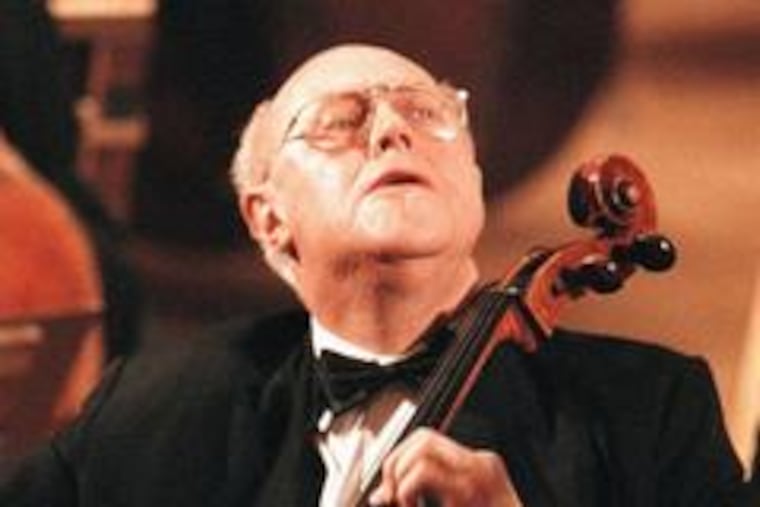Brilliant cellist Rostropovich is dead at 80
Irrepressible, effervescent and supremely brilliant, cellist/conductor Mstislav Rostropovich, 80, died in a Moscow hospital yesterday after an extended battle with intestinal cancer.

Irrepressible, effervescent and supremely brilliant, cellist/conductor Mstislav Rostropovich, 80, died in a Moscow hospital yesterday after an extended battle with intestinal cancer.
Besides being one of the great cellists of the century, he premiered some 240 new works, including the Shostakovich Cello Concerto No. 1, now one of the most-played works of its kind, which he performed for the first time in the United States with the Philadelphia Orchestra in 1959.
During that triumphant Cold War visit, he recorded the piece here with Eugene Ormandy conducting and the composer supervising, in what became an ongoing relationship both before and after his stormy 1974 departure from the Soviet Union.
He appeared with the Philadelphia Orchestra nine times as a cellist (sometimes playing two concertos, with repeated performances), three times as a conductor, and once performing both functions. His final appearance here was in April of 2002 with the Chamber Orchestra of Philadelphia in a collaboration with its music director, Ignat Solzhenitsyn.
Rostropovich was a Solzhenitsyn family friend, having risked his own reputation by allowing dissident writer Alexander Solzhenitsyn to live in his country home for four years. After Solzhenitsyn and his family emigrated to Vermont, Rostropovich visited and coached young Ignat through the years.
"Beneath his sparkling, brilliant, gregarious public persona, in private conversation Slava was utterly, deadly serious about music," wrote Ignat Solzhenitsyn in an e-mail yesterday. "For him, music really was that bridge over the unbridgeable, that expression of the inexpressible. In Slava's passing I mourn a dear friend and (in the words of his beloved Shostakovich) a true soldier of music."
Rostropovich championed living composers of all nationalities, maintaining particularly close relationships with Benjamin Britten and Henri Dutilleux. As a conductor, he premiered the Pulitzer Prize-winning Riverrun by Stephen Albert. While Rostropovich was music director of the National Symphony Orchestra (1977-1994), Leonard Bernstein, a good friend, affectionately wrote the name of Rostropovich's dog, Pooks, into his overture Slava! A Political Overture.
His performance style constantly evolved. When first heard in the United States as part of a Russian troika of super-virtuosos (including Sviatoslav Richter and David Oistrakh), Rostropovich's mahogany-colored cello tone arrived in the form of electric tempos. Later, in his conducting years, his tempos grew more contemplative. Though Rostropovich certainly knew what kind of tempos composers such as Shostakovich and Prokofiev had wanted from time to time, he was more interested in the spirit of the music, and how he expressed that changed constantly. "He was what I call a re-creative musician," said Philadelphia Orchestra violinist Davyd Booth. "He had such an active mind, and it was constantly going into every corner of a composition." Though an uneven conductor, he often referred to his National Symphony Orchestra years as the best of his life.
His influence on the cello world was profound and multifaceted. Yo-Yo Ma has often said that he has been inspired by Rostropovich to commission new works. Jacqueline du Pre, however, so awed Rostropovich that he stopped playing her signature piece, Elgar's Cello Concerto, out of respect. A man of wide interests, he also collected art. But once a year during his hectic life he would retreat to a Russian monastery for a week of silence and prayer.
He is survived by his wife, the retired opera star Galina Vishnevskaya, whom he married in 1955 and often accompanied on piano in recital, and their daughters, Olga and Elena.